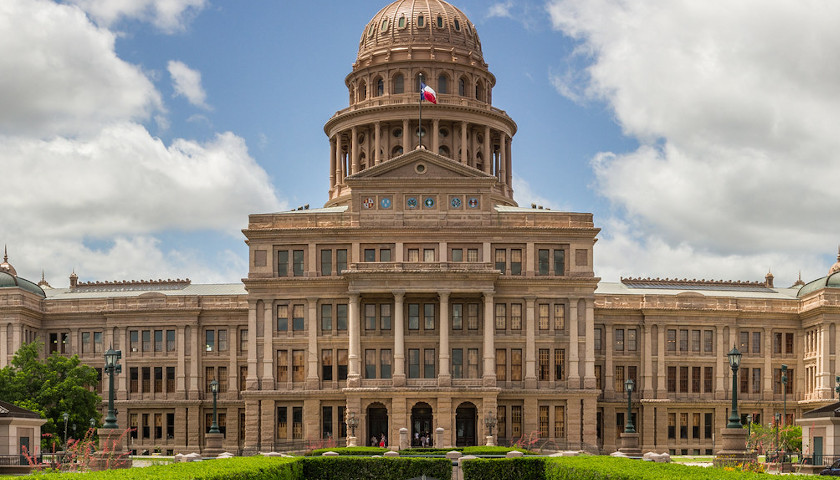by Debra Heine
The Lone Star State, like Florida, is moving to outlaw viewpoint discrimination on social media platforms.
Republican Texas Gov. Greg Abbott joined State Sen. Bryan Hughes at a press conference Friday afternoon to discuss a new bill that will prohibit social media companies from censoring opposing viewpoints.
“The First Amendment is under assault by these social media companies and that is not going to be tolerated in Texas,” Abbott declared.
“Senator Hughes’ bill – Senate Bill 12 – protects Texans from being wrongfully censored on social media, making sure that their voices are going to be heard and not be canceled or silenced,” the governor added. Abbott argued that because social media sites like Twitter and Facebook have evolved into modern day public squares, they shouldn’t be favoring one viewpoint over another.
“What Facebook and Twitter are doing is they’re controlling the flow of information, and sometimes denying the flow of information,” he explained. “And they are in a position where they are choosing which viewpoints are going to be presented. Texas is taking a stand against Big Tech political censorship. We’re not going to allow it in the Lone Star State.”
Hughes noted that many people attending Friday’s press conference may themselves have been censored by big tech speech police.
“Today, they can lock you out. Many people here have experienced that – getting locked out of social media because you don’t conform to their narrow worldview,” Hughes explained. “This bill – Senate Bill 12 – will give Texans the right to get back online when they get mistreated in that way.”
The Texas senator stressed that while Republicans hope the legislation will lead the nation in restoring free speech, it is not about protecting lewd and lascivious speech, and people still can’t yell fire in a crowded movie theater. But religious speech, and political speech are a “fundamental American and Texas right,” he argued.
In addition to prohibiting tech companies from censoring political viewpoints, the legislation also allows Texans who have been “canceled, censored or deplatformed” to file a lawsuits against the tech oligarchs, Abbot said.
“The United States of America was built on Freedom of Speech, and healthy public debate,” the governor pointed out. “Big tech’s efforts to silence conservative viewpoints is unAmerican, unTexan, unacceptable, and pretty soon it’s going to be against the law in the state of Texas.”
Texas joins Florida in the effort to stop Big Tech from censoring conservative viewpoints.
Republican Florida Gov. Ron DeSantis told Fox News host Tucker Carlson last month, that he’s looking to protect Floridians’ data privacy, add fines to tech companies that deplatform political candidates, and also allow lawsuits against Big Tech companies from Floridians who’ve been deplatformed over their political opinions.
“I think they’re we’re going to do three different things,” DeSantis explained. “One is protect Floridian’s data privacy from big tech, which is a huge issue, as you said, protect big tech from interfering in an election. And that may mean you display you deplatform, a candidate you don’t like – two guesses as to which type of candidate big tech wouldn’t like–but it also means doing the algorithms in a way that will suppress stories, or accelerate them to benefit a candidate, that’s effectively an in kind contribution.”
“And then the general protections for deplatforming users and what we’re allowing people to do is bring civil suits under the Florida deceptive and unfair trade practices statute and anti-fraud statute and also allowing the state attorney general to do that as well, if big tech is not applying their terms of service in a in a coherent and principled way, which they almost never do,” the governor added. “So we think that this is something that Floridians want protection from, and I think it’ll end up being a really good first step. I mean, there’s always been the question, what do you do about this, I think a lot of us have thought there was something wrong for a long time. But to just sit back and hope it gets better, that clearly wasn’t going to work. So we’re leading, and I think it’ll be good.”
– – –
Debra Heine reports for American Greatness.
Photo “Texas Capitol” by Jonathan Cutrer. CC BY 2.0.






While both of these efforts appear to be well-intended, and may actually help a little, both seems to fall short of what is really needed: to criminalize the denial of 1st Amendment rights. This would shift the burden of enforcement away from the victims, who often lack the resources to successfully defend their rights, and would allow the full power of the State to be brought to bear on the unspeakably atrocious behavior of these Big Tech companies. Fines and monetary damages are little more than a nuisance to these enterprises, but if high-level executives were facing jail time for their wrongful acts, that might get their attention.